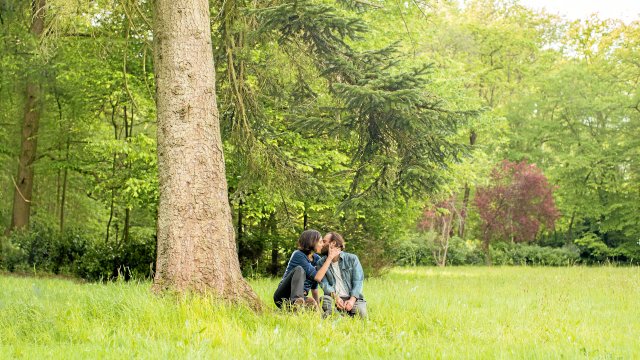Be honest: do you still feel like a child?
Photo: Carole Bethuel
We are already looking at the Corona lockdown as if through a soft focus – at least here in “Hors du temps” by Olivier Assayas. The immediate fear of a fatal course of the disease has now disappeared, whether rightly so or not, other sides of this paralyzing condition are now becoming apparent. “Outside of Time,” as the German translation of the film title says, looks back with a certain transfiguration on the time when people didn’t rush from appointment to appointment, but simply stayed at home and waited. Suddenly you had time! And as we know, this is the basis of all poetry.
The scenery: The film director Etienne (Vincent Macaigne) and his brother, the music journalist Paul (Micha Lescot), both in their mid-40s, return to their parents’ house in the country to survive the lockdown together. This type of film is called “autofictional” because both brothers are the two sides of the director Olivier Assayas, who also works as a journalist. In a certain sense, what is shown here is biographical, but in the free sense of the word, with excursions into the fictional.
Right at the beginning, the description of the house and garden is linked to the memories that both brothers had as children. Almost everything here looks the same as it did decades ago, except that the parents have since died. But Etienne still enters his mother’s room with the feeling that she is there. And the father’s magnificent library still shapes the atmosphere of the house. Nevertheless, this film does not become a “search for lost time,” as Marcel Proust undertook, but rather the present forces itself vehemently between the brothers. Although childhood unites them, Etienne and Paul discover that a lot now separates them.
For example, she is heated by the question of whether or not one should order from Amazon in this situation because, as Paul believes, this would destroy the retail sector and the working conditions there are scandalous. Retail has long since been destroyed by supermarkets, says Etienne, and no one else delivers here. There are constant differences of opinion, which quickly arouse aggression in this situation of forced shared living.
Both brothers have apparently become successful in their own way, but they now have to improvise in order to stay in the conversation about future projects. Their partners are also with them, they haven’t been there for very long and they barely know each other. Cooking food, they discover, has become a complicated affair in sophisticated circles. More complicated than the actual work is. After all, they now have what they would never have before: time that they can – and must – spend together. But under such highly individual conditions, people are actually constantly disagreeing. Still, just being in the presence of your brother, seeing the child he once was, changes them both. Your relationship, unlike perhaps that with your partner, is not a temporary one.
The virus is present as a threat, for Etienne more than for Paul, who cares little about it. When did the course of your life become one way and not another? Suddenly someone who knows about your own childhood is in the room and there is something both uplifting and depressing about that. This film achieves something astonishing: its own atmosphere carries it from beginning to end. Although the brothers often find it difficult to tolerate each other, what is created here is what can be called a space out of time. A model case for a society that is growing apart and has obviously become incapable of conflict?
The two brothers know how privileged they are with a house and a large piece of land right now. But that doesn’t make it any easier for them to be more generous with each other’s weaknesses. Surprisingly, for the two men (not their wives), the kitchen becomes a battleground for their own strong egos. Which pot is suitable for what? A cardinal question. And woe betide anyone who dares to take it lightly.
»Hors du temps«, France 2024. Director: Olivier Assayas. With Vincent Macaigne, Micha Lescot, Nine D’Urso, Nora Hamzawi. 105 min. Dates: February 25th, 8.30 p.m., Haus der Berliner Festspiele.
Become a member of the nd.Genossenschaft!

Since January 1, 2022, the »nd« will be published as an independent left-wing newspaper owned by the staff and readers. Be there and support media diversity and visible left-wing positions as a cooperative member. Fill out the membership application now.
More information on www.dasnd.de/genossenschaft
judi bola online judi bola link sbobet judi bola
